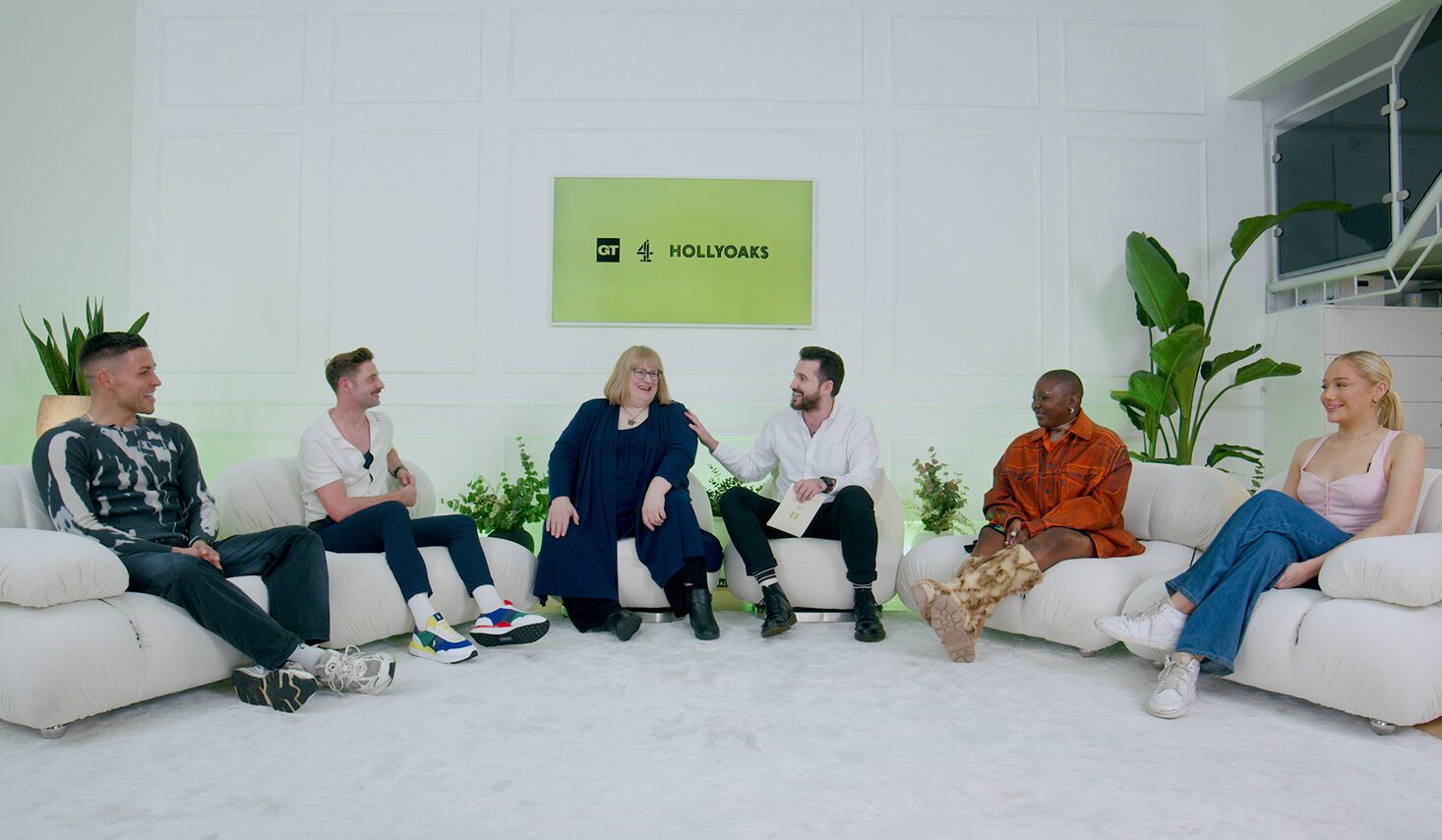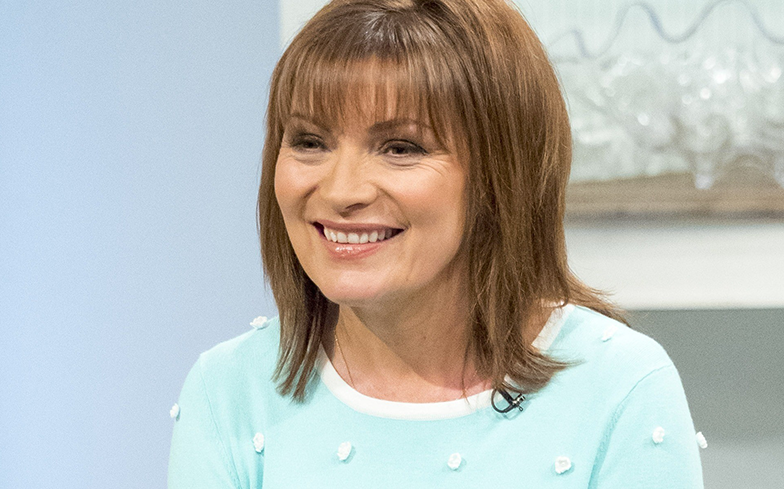
As Hollyoaks fans will know, over the last month, the Channel 4 soap has been exploring the damaging effects of ‘conversion therapy’ in a long-running storyline that recently came to a head.
Back in September, former Holby City star David Ames joined the cast as Carter Shepherd, a headteacher with a secretive, sinister plan. Under the guise of offering John Paul McQueen (played by James Sutton) self-growth sessions, he aimed to ‘convert’ him to heterosexuality – though his ulterior motive was eventually uncovered.
To coincide with the trailblazing storyline, GAY TIMES’ Conor Clark hosted a roundtable discussion, bringing together Hollyoaks star Annie Wallace, the first openly-trans person to portray a trans character in a British soap, Char Ellesse, the founder of gender-blurring storytelling platform Girls Will Be Boys, singer and presenter Jack Remmington, content creator Cheza Blonde, who uses her platform to share her experiences as a Gen Z trans woman, and journalist Daniel Harding, who underwent conversion therapy as part of an undercover report.
Together, the group reflected on Hollyoaks’ powerful portrayal of the harms of conversion therapy and discussed how the practice continues to impact queer communities today. Read on to find out everything we learned from the panel.
Nuanced representation matters
Over the past decade, there’s been more LGBTQ+ representation on TV than ever before. And although “simply existing often is enough”, as Wallace says in the case of still-rare trans representation, audiences benefit more from nuanced LGBTQ+ storylines, like this Hollyoaks one. “A friend once said to me that representation is the antidote to shame, and I feel like that’s what this storyline embodies,” said Ellesse.
To create the story, Hollyoaks worked with campaigners and advisors with lived experience of ‘conversion therapy’ – something our panellists thought made a noticeable difference. “The episode didn’t feel forced,” said Blonde. “It felt very real, honest, and raw. It went into the roots [of ‘conversion therapy’], and really [helped you to] experience what it is.”
Hollyoaks’ storyline is depressingly true to life
Harding revealed that his experience of conversion therapy was very similar to how it’s portrayed in Hollyoaks, describing the process as “a drip effect”. “It’s good to see this style represented,” he said. “You’re not really aware that it’s conversion therapy. They lure you in and give you this false sense of hope. The character of Carter is really true to the therapist that I had.”
Because it’s so true to life, Harding said it might be hard for those who’ve undergone conversion therapy to watch it. “It brings back a lot of those feelings of what you’ve gone through,” he added, “but it’s so important because it showcases how this can happen without you knowing sometimes.”
Intersectionality is the heart of any thriving queer community
Although religious beliefs can be a motivation for those who conduct conversion therapy, it’s not always the case, as Hollyoaks strived to portray. “I liked when John Paul said, ‘Well, I’ve grown up in a religious family and there was no issue at all’, because it’s easy to just vilify all religions as the cause of this issue,” said Remmington.
“It showed how a deeply religious family could actually understand and go, ‘No, you’re still my son’, and that in itself speaks volumes,” agreed Wallace.
Ellesse sees this as an example of how vital intersectionality is within LGBTQ+ communities. “Intersectionality is really important when we talk about any kind of marginalisation, because often they do crossover,” she said. “This storyline shows that you don’t have to be ashamed about any part of yourself; being able to see that in someone else, and know that other people are seeing it as well, [is really affirming].”
LGBTQ+ friendships can help people unlearn misinformation about ‘conversion therapy’
In 2022, a GAY TIMES and Channel 4 survey revealed that 93 per cent of LGBTQ+ people believe it’s ‘very important’ for ‘conversion therapy’ to be banned for all. Discussing these stats in relation to the Hollyoaks storyline – which Remington said taught him a lot about the practice – our panellists agreed that a lack of education combined with widespread misinformation likely led to seven per cent viewing a ban as of average or little importance.
“There’s still people who think, ‘If I’m not happy with being gay, I should have the right to seek counselling as a way out of it’,” said Wallace. “And that comes from societal, religious, and parental pressure. That little percentage is a window into people who are like, ‘I’d give anything not to be gay’, and that’s ultimately misinformation. These people need friends; peer support is everything in our community.”
“I would have been far more susceptible to being taken advantage of when I was younger and growing up in a small town where I was literally the only gay in the village,” added Remmington. “The more that I’ve been welcomed with open arms into queer communities and spaces, the more confident I’ve become in my own identity.”
Where there’s dark, there has to be light
Although ‘conversion therapy’ is a devastating and heavy topic, Hollyoaks made an effort to show how queer communities rally around each other to bring lightness into the dark. “You see all of these characters coming together – you’ve got all of this love around here, and then you’ve got this scene that’s really intense,” said Harding. “It was great to see John Paul stand up and show courage. He mentions that his family are religious and they accept him. It’s showcasing that it’s not about this. You can be gay and be loved.”
“The togetherness and solidarity of the LGBTQ+ characters at that moment, is really indicative of the community as a whole,” said Wallace.
The key takeaway? Support your queer friends
The UK government has been promising a ban on ‘conversion therapy’ since 2018. Although progress was made in early December 2023 with the arrival of a draft bill, a vote isn’t set to take place until March 2024.
Still, Ellesse and Wallace are both hopeful that such a real and poignant storyline on a hugely popular show like Hollyoaks will provide people, and particularly straight and cisgender people, with the knowledge and the tools to help others who have endured – or are currently enduring – conversion therapy.
“In the times we’re living in right now, it’s scary to be an LGBTQ+ person,” said Blonde. “So [this storyline] is really important.”
Watch the full discussion below or click here.
Stream latest episodes of Hollyoaks on Channel 4.
